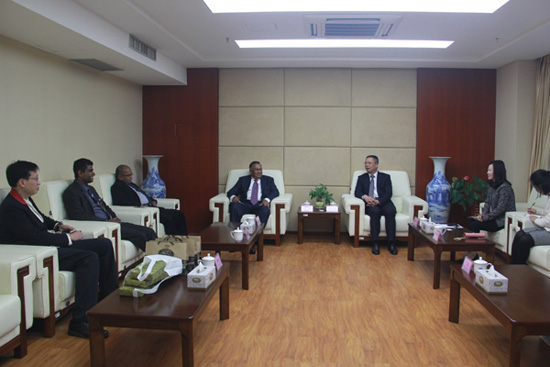

Karunasena Kodituwakku, ambassador of Sri Lanka to China, meets with Yao Jianhong, deputy head of the Xiamen foreign and overseas Chinese affairs office. [Photo/xmfo.gov.cn]
A tea culture exchange was held in Xiamen, Fujian province on Dec 26, aiming to promote tea trade between China and Sri Lanka.
Sri Lanka is especially known for its Ceylon tea, a type of fully fermented black tea, which can be consumed straight or mixed with milk and sugar. As black tea is said to be quite beneficial for women, more females are turning to black tea as their tea of choice.
Since 2013 when President Xi Jinping proposed the Belt and Road Initiative, more Chinese people began discovering Sri Lanka and its culture and started drinking tea from Sri Lanka. From 2011-2014, China ranked 11th in major exporting countries of Ceylon tea and Sri Lanka ranked second in major importing countries of Chinese tea, according to Hasitha De Alwis, director of promotion from the Sri Lanka Tea Board.
After the activity, Karunasena Kodituwakku, ambassador of Sri Lanka to China, met with Yao Jianhong, deputy head of the Xiamen foreign and overseas Chinese affairs office. They exchanged ideas on the cooperation opportunities facilitated by the Belt and Road Initiative, in areas such as tea industry, port, logistics and tourism. The ambassador also vowed to strengthen pragmatic cooperation by seeking the establishment of sister city ties between Xiamen and port cities in Sri Lanka.
China has launched a new pilot program to allow eligible enterprises greater access to overseas financing in support of green and low-carbon transformation projects, the country's foreign exchange regulator said on Aug 21.
To further streamline the experience, China is expanding tax refund stores, broadening the range of refundable goods, and refining refund procedures, ensuring an efficient and seamless shopping experience for global visitors.